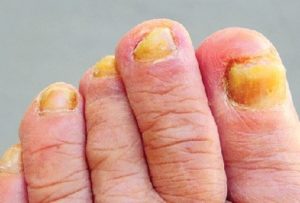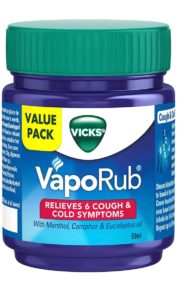What causes yellow nails?
Nails can tell you a lot about your overall state of health. When they become yellow, it usually means that you have a fungal infection or is part of the ageing process. But there are other causes. We will now go through the causes of yellow nails, and its treatment.
Before that, let’s start with the basics.
Typical nail changes
- All nails may be affected, or it may just be the toes (one foot or both)
- Nails are slow growing or appear to have stopped growing
- Nails become thicker and turn a pale yellow or greenish-yellow colour with edges slightly darker
- Nails mainly remain smooth but may be cross-ridging and nail humped with loss of cuticles
- Onycholysis (separation of nail from the nail bed) may affect one or more nails

Causes
Fungal infections
-
Onychomycosis: a fungal infection that penetrates the nail and causes discoloration. Usually the first (big) toenail is affected first.
-
Ringworm: a fungal infection that can spread to the nails.
Ageing
-
As people age, their nails become thicker, more brittle, and more prone to discolouration.
Other causes
- Psoriasis: usually associated with nail pitting.
-
Nail polish: using nail polish that contains harsh chemicals or dyes can stain nails yellow.
-
Genetics: some people may be more prone to yellow nails due to their genetic makeup
- Yellow nail syndrome: A rare disorder that can cause yellow nails, along with respiratory symptoms and lower limb lymphoedema. The cause is unknown, but it may be genetic or acquired.
Chronic medical conditions
-
Diabetes: high blood sugar levels can cause nail discoloration.
-
Chronic liver disease: liver dysfunction can lead jaundice (that includes the nails).
-
Chronic kidney disease (CKD) and/or nephrotic syndrome: kidney dysfunction can cause a buildup of waste products, leading to nail discoloration.
- Bronchiectasis.
-
Thyroid disease: hypothyroidism (underactive thyroid) or hyperthyroidism (overactive thyroid) can cause nail changes.
- Rheumatoid arthritis (RA).
Lifestyle factors
-
Smoking: nicotine and tar in cigarettes can stain nails yellow.
-
Excessive exposure to chemicals: detergents, cleaning products, or nail polish removers can cause nail discoloration.
-
Poor diet: lack of essential nutrients, vitamins, and minerals can affect nail health.
Treatment
- Nail changes once established are usually permanent, although complete reversion to normal nails has occurred in some cases.
- If the cause is fungal, itraconazole and fluconazole are effective oral agents. It has been noted that they appear to speed up the rate of growth of nails, which may be of benefit in yellow nail syndrome even though it is not caused by fungal infection.
- Some studies have shown that nutritional supplementation with vitamin E appears to be effective in controlling yellow nail syndrome, for unknown reasons.
- Zinc supplements have also been used but it is unclear whether they are effective.
- Vicks VapoRub: is said to be effective, applied thinly once a day, morning or when you go to bed. There is not much evidence for this, but it may be worth a try. Some recommend tea tree oil.

Prevention of yellow toenails
Practicing good foot hygiene, keeping the toes clean, and treating underlying medical conditions may help prevent yellow toenails.
Summary
We have described what causes yellow nails, and focused on their treatment. We hope it has been helpful.

